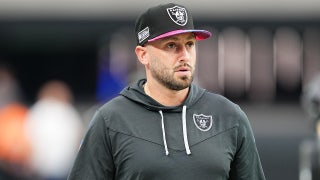The Boston Bruins and Buffalo Sabres were considered heading in different directions entering the current NHL season.
Boston was coming off a very impressive performance in 2008-09, having finished atop the Eastern Conference standings. Goaltender Tim Thomas won the Vezina Trophy as the league's top goaltender, Zdeno Chara was awarded the Norris Trophy as the top defenseman and head coach Claude Julien won coach of the year honors. Despite bowing out of the 2009 playoffs in a tough seven-game second-round series against the underdog Carolina Hurricanes, the Bruins were ranked among the favorites to contend for the Stanley Cup in 2010.
By contrast, NHL experts were split over what to expect in 2009-10 from a Sabres club that had struggled to regain the form which made them Conference finalists in 2006 and 2007. Consensus suggested the Sabres would be a marginal playoff contender, one that would either make or miss the 2010 postseason by a slim margin. They certainly weren't expecting them to place anywhere near the top of their division and conference.
With just over two months remaining in this season, both clubs are still heading in different directions but surprisingly, the roles have been reversed.
The Sabres find themselves atop the Northeast Division and among the leading teams in the East while the Bruins have struggled and are in danger of falling out of the Eastern playoff picture.
What happened to cause such a dramatic shift in their fortunes? It wasn't just one factor but rather a host of them.
Bummed in Boston
The biggest issue behind the Bruins' struggles is the stunning decline in their offensive production.
Last season, the Bruins were second only to the Detroit Red Wings in goals scored per game but in 2009-10, they're dead last in that department. Last season, their power play was the second-best overall but in 2009-10, it currently ranks 18th.
Injuries to key forwards Marc Savard, Milan Lucic and Patrice Bergeron have contributed to their offensive decline. The loss of Savard, their best forward, for nearly half the season to multiple injuries has been a significant blow.
That's not the only reason for the offensive slide. Forwards David Krejci and Michael Ryder are well off their strong numbers from last season while sophomore Blake Wheeler hasn't made significant improvement over his rookie performance.
It also appears they're missing the contributions of former Bruins forward Phil Kessel, who was shipped to Toronto last fall. The often under-appreciated Kessel contributed 36 goals last season to the Bruins attack, which management this season has yet to replace.
Defense has also been a factor. In 2008-09, the Bruins allowed the fewest goals-per-game of all 30 teams, but this season they've allowed the eighth-most.
They gave up a high number of shots last season, ranking among the top third in total shots-against last season, but the combination of their potent offense and Thomas' stellar goaltending masked this problem.
This season, the Bruins have significantly reduced their shots-against, ranking 12th overall in that department, and have the third-best penalty kill. But with their anemic offense and the combined struggles of Thomas and backup goalie Tuukka Rask, they haven't exploited that improvement.
With only one victory in their last ten games heading into this week, the Bruins must get back on track soon or risk missing the playoffs.
Winning battle
Meanwhile, the Sabres' reversal of fortunes has been particularly noteworthy considering several of their star forwards have not posted strong offensive numbers.
Thomas Vanek, Jason Pominville and Derek Roy remain well off the pace of their respective career-best performances of two years ago while forwards Drew Stafford and Clarke MacArthur have yet to make significant strides in their anticipated development into scoring forwards.
Still, they've been able to spread their scoring throughout their lineup to rank 11th in goals-per-game average, a slight increase over last season.
Playmaking center Tim Connolly has been a significant offensive factor this season with 49 points in 53 games. If the oft-injured Connolly can stay healthy this season he could reach a career-best 75 points.
Another contributing factor to the Sabres improvement is the play of hulking (6-foot-8, 222-pound) rookie defenseman Tyler Myers, who's not only among his team's leaders in points but also leads in ice time, averaging over 23 minutes per game, and currently has the second-best plus-minus on the team.
Myers also ranks third in NHL rookie points this season and his overall play makes him a favorite for rookie of the year honors.
The Sabres have also improved their goals-against and penalty-killing numbers this season. Part of this can be attributed to their overall team game, but it is primarily due to the stellar play of goaltender Ryan Miller.
Heading into this week, Miller led all NHL goalies in goals-against average (2.03) and save percentage (.935), tied for fourth overall in victories with 29 and is tied for third in shutouts with five. Those numbers become more impressive when one considers he's faced the fourth-most shots of all NHL netminders this season.
The odds-on favorite to backstop Team USA at the upcoming Winter Olympics in Vancouver, Miller has emerged this season as arguably the NHL's best goaltender, earning talk of a Vezina award and perhaps a nomination for the Hart Trophy as this season's league MVP.
Without Miller's superb goaltending, it's doubtful the Sabres would be battling for one of the final playoff berths in the Conference.
The Sabres should be able to hold off any late-charging teams and finish first in the Northeast -- if Miller can stay on top of his game for the rest of the season, his teammates can cut back on the amount of rubber he's facing, and Vanek, Pominville and Roy can score with more frequency








































